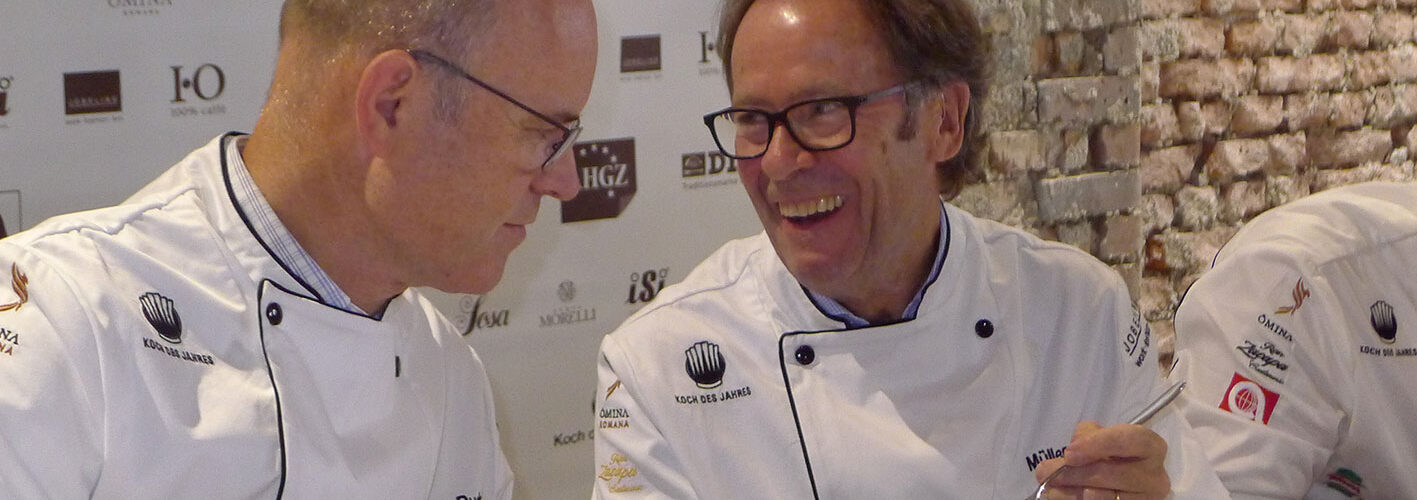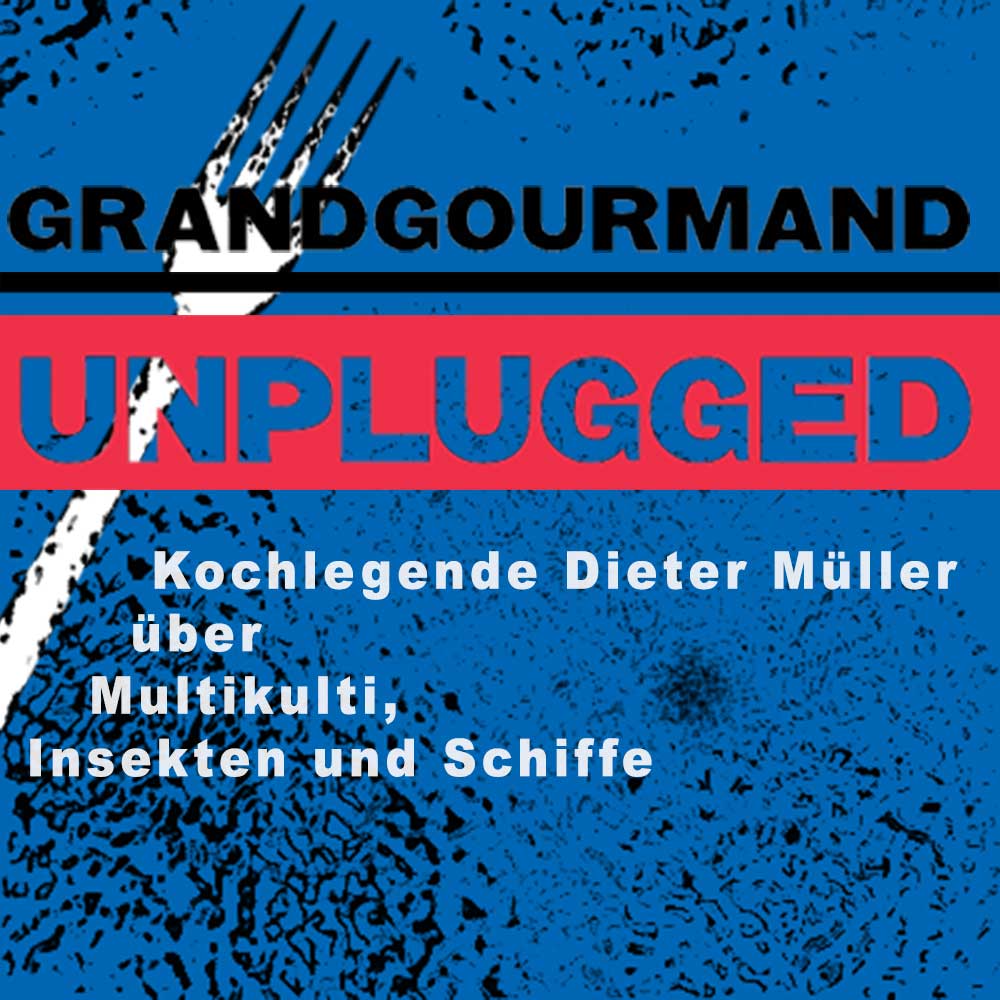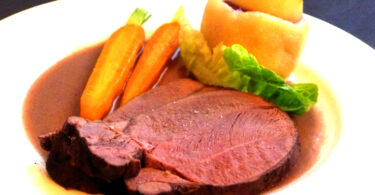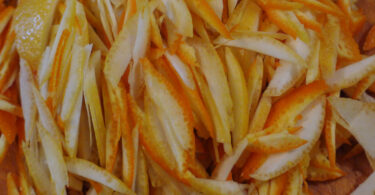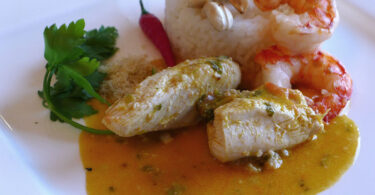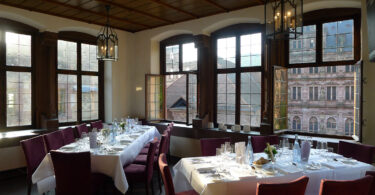[quote]DIETER MÜLLER, born 1948 in Auggen, a small wine village in Baden, grew up – as the second eldest of seven children – so to speak with pot and stove. His parents run the inn “Lug ins Land”. He completed his culinary training in 1971 as the best of 200 candidates and during the following years of traveling he became acquainted with the classic French cuisine under old master Ernesto Schlegel in Bern.
From 1973 onwards, he and his brother Jörg cooked together in the Schweizer Stuben in Wertheim – just one year later, their work was awarded the first star in the Michelin Guide. 1977 follows star number two. From 1981 to 1990 Dieter Müller is the head chef and becomes cook of the year twice. The Gault Millau ranks him among the 16 best chefs in the world and is the first German to be awarded 19.5 points.
After another wandering tour, Dieter Müller began in 1992 as the restaurant’s patron in the Schlosshotel Lerbach – the continuation of a unique success story: in 1993 the first star of Guide Michelin, in 1994 the second star, in 1997 – together with 32 other chefs worldwide – the third star, the culinary peak. In 1998, Dieter Müller was awarded by “Der Feinschmecker” (“The Gourmet”) as Chef of the Year. In 2002, he received the highest mark for the first time in all gastronomic guides. In 2005, his restaurant was named the best restaurant in Germany by the English magazine “restaurant” as one of the top 50 restaurants in the world – no other German restaurant has made it into the top 50 so far, and the Gault Millau 2006 awarded Dieter Müller a top score of 19.5 points. [/quote]
These lines are written by the German gastro critic Wolfram Siebeck. Dieter Müller remained on friendship with him until Siebeck’s death, and the two appreciated each other.
How could I begin an interview with the great chef better than with the quote of an equally great critic, hardly anything remains to be added to Siebeck’s words.
Dieter Müller is a German cooking legend and he is as active as ever. He spends 80 days a year on the MS Europa, where he runs his restaurant of the same name “Dieter Müller”, the audience is grateful to him, the legend lives! As President of Koch des Jahres, Dieter Müller leads an extremely demanding competition.
I was very fortunate to be invited to an interview with Dieter Müller. Originally I wanted to make it very traditional, but we got along so well that a inspiring conversation developed. Dieter Müller discusses current developments in culinary art, the Koch des Jahres competition, the multicultural factor of gastronomy and many other exciting topics.
An essay of this length is not suitable for an online medium without bringing it into a suitable form. Hence the interesting views, experiences and emotions that Dieter Müller expresses in his inimitably sympathetic way appear in the new column UNPLUGGED in a casual sequence.
Grandgourmand hopes that the column will in future be filled with further interesting essays, opinions and thoughts in order to keep up with the culinary events.
We would like to wish you a lot of fun with the first episode!
GG:
Dear Dieter Müller, to this day your Amuse Bouche menu is at the top of the list of pioneering kitchen formats. The idea was born in 1992 in your restaurant “Dieter Müller” in the Schlosshotel Lerbach. The Amuse Gueule became an Amuse Bouche, the birth of the tasting menu.
At that time, you served for example Sylter Royal oysters with red wine shallots vinaigrette, champagne tripe with pulpo and leaf salad sauce, or of course the legendary crème brûlée of foie gras with praline in pumpernickel coating.
Known also your fine pigeon version with long pepper, light liquorice smoke and Pancetta foam.
Today these amuses-bouches are timeless classics, established formats.
In the post-Adrià era, is there any new revolution in the culinary sky, or at least new ideas that will revive the complicated metier?
Dieter Müller:
First of all, it’s always nice when someone writes by heart, just as he reports about the participants of a competition, it has to be someone who also likes to eat!
In England, I experienced this quite differently when I cooked at the “St. James’s Hotel and Club of the Althoff Hotel Collection” in London. One day a young journalist appeared, apparently without much knowledge of the subject, at that time I thought: “Oh my God, the London press sends out everything and everybody, I was very surprised.
But regarding your question:
You must have ideas, this has always was my strength, I have often set the line, for example in Wertheim, with Mediterranean cuisine. Of course, I am also rooted in my Baden cuisine. There are good middle-class restaurants in Baden, where you can learn well and if you work on yourself and have talent, you can make a career later on. Baden has a lot to offer: wine, food, farms. As a child I helped out on the farm, was allowed to drive a tractor when I was 12 years old and I was very proud of it, that was in Müllheim. I grew up in Müllheim, not far from the vineyard Dörflinger with its wonderful Gutedel, the Markgräfler Land.
My grandfather was a district administrator during the difficult years of the war, and he told me about that again and again.
GG:
In 2016, together with refugees, you organised a very special evening with dishes from these people’s homelands. Could the culinary scene not adopt this idea to show how important and stimulating the multicultural element is in our society?
Dieter Müller:
Sure, I think it was a very enjoyable event, which I volunteered just like Koch des Jahres.
When everyone stands at the stove with their friends and they celebrate their favorite dish from home together, this is incredibly exciting, the event was also very successful.
I am an aesthete and I was a little bit scared before, they called me a “Vor-Kölner” at that time, you know, it is not necessarily usual that the people of Cologne change to the other side of the Rhine to visit me in Lerbach, but they were already proud that there was a restaurant “Dieter Müller”. A politician once said: In Cologne there are 3 important things: The cathedral, Millowitsch and Dieter Müller for the culinary delights, that was a great honor for me.
With a 3-star chef, you naturally have a little more presence in the press and the media. It took a certain amount of courage, at least in the beginning. I was observed with wide eyes, I am an accessible person, I go everywhere and try everything, they were of course very proud.
It’s unbelievable what is currently happening with market-fresh cuisine, for example in Berlin, small restaurants, where the world is served to you.
That’s exciting, everyone finds his or her taste.
First the Italians were the pioneers, of course the Spanish cuisine, followed by the Asians. It’s unbelievable what is being cooked at the moment. Recently we were eating Turkish food, together with my son who works in the Berlin Adlon, I know Berlin very well, I used to be a 2-star chef with Henry Levy, who led the “Maître” at that time.
At some point in his life Levy left Berlin because he didn’t get 3 stars, so we know that they got Witzigmann and others.
Also in Cologne there was a German chef in the 90’s who had three stars before Wohlfahrt, this was in the “Goldenen Pflug” at that time. (Dieter Müller refers to Herbert Schönberner), but they didn’t have the big success, which is a pity, maybe it was because the restaurant was housed in a big apartment building, and overall it was a bit too stiff, the people of Cologne love it a bit more relaxed.
The university cities are very interesting in terms of culinary delights, and there is a great deal of focus on vegetables, vegetarian and vegan cuisine. The trends mix together wonderfully, the couscous from Arabic cuisine or curries from Indian cuisine, very well. Even if it is still beautiful and freshly cooked, I feel completely at home in my world.
After leading two great restaurants from zero to the top, in Wertheim with my brother and then in Lerbach with my wife, I am very lucky to be able to experience a new highlight on the MS Europa. With the MS Europa I have a strong partner and a great, grateful audience. I travel around the world and can go to markets everywhere in the big cities, we also offer cooking courses and market visits on board of the ship, such as in Hong Kong. Everything that swims and lives is killed in front of the eyes of the participants, for Europeans it takes a little getting used to, but it is refreshing!
Thirty years ago I already worked as a guest chef in Tokyo, I was in Bangkok in the “Oriental”, I had fantastic stages in my career, now back on the ship, it’s wonderful and as I always say: this is not a final, next year there will be another project in Berlin.
This is also a very valuable experience for the young ship’s employees, as I have the highest rating on a cruise ship and I am also the only one who is on board for 80 days. In the meantime there are of course some other ships with gourmet cuisine, but there are often re-cooked, or signature dishes are served. Tim Raue from Berlin does this kind of thing, but he has people somewhere who realize his recipes, I have a small, intimate restaurant with about 30 seats. Guests are invited for a 7-course dinner, which is something very special.
I take every opportunity to enter the market with my crew, invent new dishes and modernize classics.
GG:
Resources are becoming increasingly scarce. In the future, we will have to give up well-known eating habits and get used to completely new culinary experiences.
Could you imagine a insect menu?
Dieter Müller:
I must say that I have a “disgusting factor”, like 90 or 95 % of all people in Europe, in Asia this is very different.
For the daring ones there are insect buffets, for me that would be something only if I had to starve to death, then one eats everything. I prefer to stick to taste and creativity, but somehow something can fall into the menu.
I even have a little story to tell. Once I was in Copenhagen, at that time I had the star-eaters on board (editor’s note: the star-eaters are an online-critic portal).
They didn’t get a reservation for the noma unless I came with them. I promised andwe went to the “Noma” together, a German sous-chef cooked at that time, everything was very professional. We took a close look at it, many young employees who gave up a salary just to be allowed to cook in the “Noma”, I also had the same experience at Ferran Adrià, I was with all the stars, I even made a fabulous film with Ferran.
Anyway, we were led into the kitchen, the whole thing was filmed with a cell phone. The chef then announced something very unusual, they brought us ants, which were well chilled Danish ants, they just crawled around a little bit.
At that time a couple of colleagues were there, the German Sous Chef then pointed out to us that this ant speciality was prepared for the Olympics in London, or to be more precise, for a dessert.
Of course, a restaurant like the “Noma” can allow itself this kind of approach, in Lerbach this would not have been possible, it would have had a rather negative than positive effect on us. The “Noma” is known for its experimental cuisine.
A colleague came up to me:”Well, Mr. Müller, now it’s your turn! “My God,” I thought to myself, “I didn’t want to eat insects,even they still looked aesthetically, not like cockroaches or anything.” I also tried the ants and was filmed. I was surprised by the acidity, a biting acid, in my head I already imagined what I could do with it, perhaps as a substitute for lime, something like that. But then it became clear to me that if you squeeze or crush them, they turn grey and abandoned the idea.
Anyway, the next day you could read in the press: Even 3-star chef Dieter Müller is now eating insects!
I think there are some countries that have a connection to insects. In South America there is a festival where pancakes are served with potato beetles. For the children this is a lot of fun, the beetles crawl up their faces while eating, besides that the potato beetle plague is also moderated a little bit. This is a very protein-rich diet.
In my cooking class, there was once a lady who travelled on an Indian luxury train (Note: It is the “Maharaja” Express with noble bathrooms, a bar and two restaurants).
For dessert there was something very soft and caramelized, the lady tried it very carefully, at the second bite she asked the waiter what it was. The dessert consisted of cherubs, which was a bit too much for the good lady. Discreetly, she went to the toilet to relieve herself.
Sometimes it’s just better not to know what you’re eating first.
Dieter Müller Unplugged 2
Dieter Müller Unplugged 3
[box]Kochen und Genießen
Mit Sternekoch Dieter Müller
Mit diesem Kocherlebnis möchte Dieter Müller Sie in eine Welt des kulinarischen Genusses entführen. Verbringen Sie mit ihm einen Kochtag in der ganz privaten Atmosphäre bei Müllers im schönen Odenthal, im Bergischen Land, ca. 20 km von Köln entfernt.
Sie kochen zusammen mit dem Sterne-Koch ein Menu, das sich an den Produkten der jeweiligen Jahreszeiten orientiert und seiner Kochphilosophie entspricht: aromenreich, modern, zeitgemäß, mit frischen Kräutern. Er gibt Ihnen Tipps und zeigt Ihnen Tricks. Sie lernen beispielsweise die Zubereitung von Fonds und Saucen, er erklärt die eingesetzten Produkte, schult in Warenkunde und den Umgang mit Messern und Schneidetechniken.
Und so gestaltet sich Ihr Kochtag: Nach einer Besprechung des Einkaufs, der Rezepte und des Menus wird jeder Gang von Dieter Müller persönlich vor- und zubereitet – natürlich mit Ihrer Hilfe. Mit abgestimmten Weinen genießen Sie dann das Menu, umsorgt von Birgit Müller, an einem festlich eingedeckten Tisch. Übrigens: Wer meint, er könne nicht gut genug kochen, dem möchte der gebürtige Südschwarzwälder die Hemmungen nehmen und zeigen, wie viel Spaß es macht gemeinsam am Herd zu stehen. Kochen und gemeinsames Genießen, sich auszutauschen in einer Runde „Gleichgesinnter“ verbindet ungemein. Zumal Ihre exklusive kleine Runde aus maximal 8-12 Teilnehmern besteht.
weitere Informationen auf http://www.dietermueller.de/kocherlebnis/
[/box]![[:de]Grandgourmand, Travel, Food, Lifestyle[:]](https://grandgourmand.de/wp-content/uploads/2023/01/logo_23_1-1.png)
